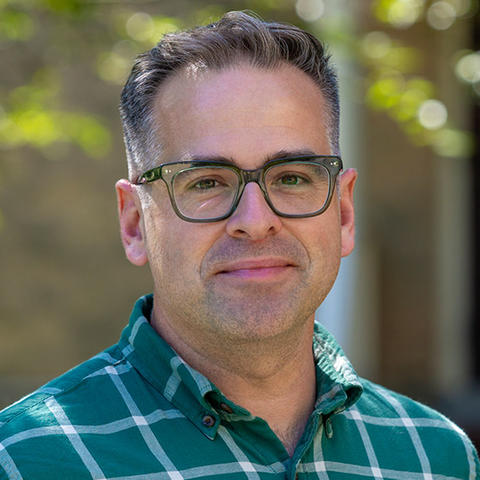Two Students Receive Innovation Microgrants

Emile Roth '27 created the card game Cursed Campground after spending a summer with the Vermont Youth Conservation Corps. Photo by Patrick Montero.
Details
The grants provided by the Haverford Innovations Program are intended to sustain Fords' entrepreneurial spirit during the busy academic year.
Last summer, as he was well into a two-month stint with the Vermont Youth Conservation Corps, Emile Roth '27 was ready to escape. Stationed near the sleepy burg of Groton in northern Vermont, Roth spent much of his time engaged in construction work in a state park. While he built structures, he also built a community of friends among his crew, but it left little room for time with friends and family at home.
"It was very fun," Roth says of the experience, "but by the end, I was definitely getting a little tired of it."
Roth capitalized on that potent mix of homesickness, FOMO, and cabin fever to create Cursed Campground, a card game for two to four players that challenges them to work collaboratively or alone to escape the monsters haunting the titular campground. Roth's vision is bolstered by a Haverford Innovations Program (HIP) microgrant, launched in 2021 to support Fords' entrepreneurial spirit through grants of $200 each.
The grants are intended to sustain student ideas during the hectic academic year when students are focused on their coursework and exams rather than extracurricular projects. So far, the microgrants have supported projects like Fords Closet, a student-run consignment shop, and MATchMapper, which aggregates public data to support those seeking medication-assisted treatment for opioid addiction.
Roth says he developed the earliest iteration of Cursed Campground while still in Vermont's verdant woods. The prototype draws on mechanics gleaned from popular board and card games and was doodled on small squares of graphing paper that Roth keeps in an old Dove soap box. Since then, he's consulted with fellow game designer and HIP Summer Incubator participant Matthew Denton '24 while also creating the game's initial artwork. Roth, who comes from a long line of visual artists, has developed a slate of characters and monsters based on his crewmates. Roth himself even makes an appearance as The Chef.
"I may be a little biased, but I thought my cooking was the best out of everybody in the crew," Roth, who attends Haverford with his twin brother Issac, says.
Pranav Rane '25, who double majors in computer science and physics and minors in mathematics, is also receiving a microgrant this semester. Like many students, Rane recalls times during his studies when he struggled to remember concepts and ideas he'd learned years prior. His project, which runs parallel to his senior thesis, is centered on automated knowledge retrieval, which he hopes will benefit the students who follow him.
"High school and college students have a lot of content thrown at them," Rane says. "What I've learned from my experience and that of my friends is that two or three years later, you often forget a lot of the concepts you've learned in classes, life, or research."
Rane is turning to artificial intelligence and large language models like ChatGPT to find a better way to store and retrieve knowledge. His project hinges on using eye-tracking technology to record and store what a user reads and create a personalized knowledge database. He also plans to build a backend that will retrieve relevant information for the database to provide context and reinforce what the user is learning.
Rane seeks to elevate the concepts behind retrieval augmented generation (RAG for short), architecture developed by Meta, the company behind Facebook and Instagram, to help generative AI provide more accurate and up-to-date answers to queries. To Rane's knowledge and that of his thesis advisor, Associate Professor of Computer Science Sara Mathieson, no one has attempted to leverage RAG to create personal learning databases that also encourage interdisciplinary thinking.
Rane says the microgrant will support the creation of his proof of concept since access to existing AI architecture comes with a cost.
"This will be hyper-personalized since it will draw on the exact things students have read two or three years earlier," Rane says. "Hopefully, it will help them relate to what they already learned, making the learning process and forming new connections a lot smoother."




